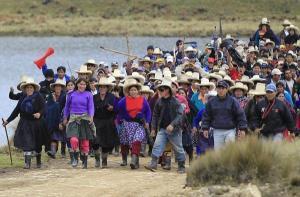From Root Force:

Indigneous Quechua-speakers in Peru have been at the forefront of the battle against Newmont Mining Corp’s Minas Conga gold mine.
Two recent news stories highlight the fundamental problem with directing reformist efforts at a global economic system that is founded on colonialism, genocide and extinction. While of course it’s important to use a diversity of tactics to achieve our goals, and while it’s important to recognize and celebrate even partial victories, these stories remind us how the system reacts when we achieve victories that actually threaten its ongoing profits:
• Despite a 2012 ban on hard-rock mining in a one million acre area surrounding the Grand Canyon, the uranium mining firm Energy Fuels Resources has been given federal approval to reopen its Canyon Mine. The rationale? The company’s “rights” to extract a poisonous fuel by destroying the Grand Canyon, the surrounding watershed, and indigenous territory predate the ban.
• In Peru, the government is rolling back a landmark indigenous rights law at the behest of mining companies. Under the new policy, mining companies no longer need to even consult with the vast majority of Peru’s indigenous peoples before proceeding with plans to destroy their land.
The “prior consultation law” was adopted in 2011, in an attempt to stem ongoing and often violent conflicts over exploitation of indigenous territory in both the highlands and the jungle. While the law does not actually allow indigenous communities to veto mines, oil drilling or other extractive projects in their territory, it does require companies to negotiate agreements for such extraction.
It’s telling that even this half-measure has been strongly opposed by industry ; companies seem to be claiming that they can’t make a profit if they’re forced to get permission from the people who’s land they’re destroying.
Underlying their fears is the fact that approximately 50 percent of Peru’s population is indigenous. So the government has swooped in with a simple solution: redefine “indigenous” to invalidate the identity of millions and exclude them from protection under the law. The government has stated that Quechua-speaking Andean people will no longer be considered “indigenous,” leaving only Amazon-dwelling indigenous groups protected.
This change excludes three to five million indigenous Quechua speakers with a distinct culture, language and tradition of shared land use and stewardship. Notably, this population has also strongly opposed big mines in recent years.
On top of this, the government has also started exempting “exploratory” projects from the prior consultation law.
So do these examples mean we should stop fighting the system’s attacks on our rights and on the places we love? Of course not! But they do demonstrate that as long as this system is standing, it will keep overturning our victories as fast as it can. We will never have justice until we tear the whole thing down.

